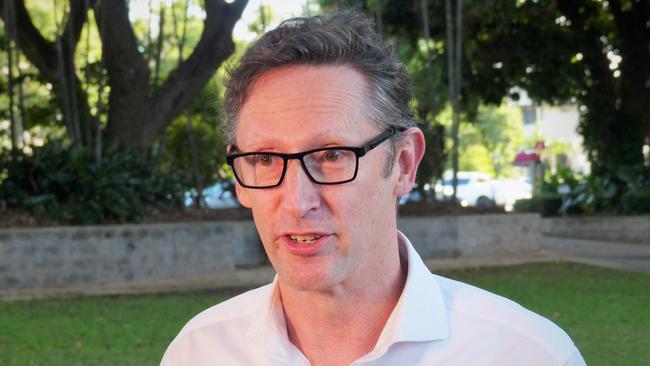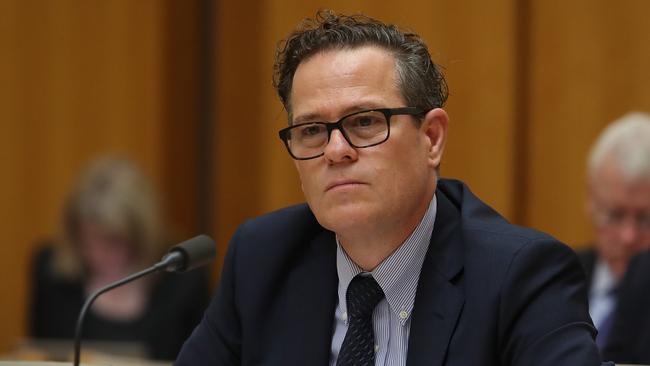Super savings are seen as an easy target for the aged-care conundrum even though it’s unfair


If there is a policy problem in Australia, it seems the automatic solution is to see what can be lifted from retirement savings.
Finance Minister Stephen Jones is actively reviewing a major proposal from the aged-care lobby to access the super system to solve age care funding.
What’s on the cards? One idea is to ‘‘ring-fence’’ super contributions so that the saved money could only be used down the line for aged care.
Another proposal is to offer tax incentives to older Australians so they would take out super to pay for aged care. That’s a novel idea, considering that for most retirees super is tax free already.
Bright ideas about tapping the super system never stop coming. The heart of the issue is we have $3.5 trillion in super savings and it is a honey pot for pressure groups.
The former Morrison federal government opened the floodgates when it allowed people to access their super during the Covid-19 crisis. It broke the golden rule that super savings were strictly for financing retirement.
Now it’s open season – let’s use super to solve the housing crisis, let’s use super to solve the climate crisis.

But this new proposal has legs and highly placed government figures are calling it a “no-brainer”. Jones, who has already added new taxes to super, can’t wait to get a crack at accumulated superannuation savings.
Jones says it is not the purpose of super to shelter funds that may eventually be inherited by the next generation. ‘‘It strikes me as odd that a third of the value of cheques that super funds are writing are for bequests,’’ he says.
The politics might play well in portraying older Australians as using super as a slush fund.
Nobody mentions that money passed on in a super fund gets hit with 15 per cent tax, while the same money outside super would not face tax at all.
In short, the “super for aged care” proposal is inherently unfair.
You can save for super and never need aged care. In fact you would be short changing yourself if you never used aged care under this plan, because you would have paid for it when you were younger!
One of the first groups to shoot down the idea has been the all-powerful Industry Fund Services group, which represents the industry funds such as AustralianSuper, CBUS and Hostplus.
Chief executive Bernie Dean says: ‘‘Commandeering a portion of super guarantee for aged care is unfair to those who won’t need it and diminishes the ability for many Australians to save for other things they need.’’
The industry funds have power in the ALP, but they did the government no favours when Canberra tried to get them involved in social housing. Jones will upset the big funds if it suits his purposes.
Ironically, there are few other sectors in society more aware of the failings of the aged care system than older Australians trying to build – or live on – super savings.
It is clear the aged care system is barely holding together; on international measures it has been underfunded.
Earlier attempts to semi-privatise the sector have been a failure, socially and commercially.
As social affairs editor Stephen Lunn reported this week, “Aged care is the fourth largest payment program for the federal government, according to the budget, at $32bn for 2023-24, rising to almost $40bn by 2026-27”.
Yet a large portion of privately held aged care homes run at a loss. As for the sharemarket, the listed aged care sector is has been a sorry story. Take a look any stock. Regis Healthcare, for example – five years ago it was trading higher than it is today.
Most independent investors will no have illusions about aged care – they know it is expensive. As retirees they will try to rely on their super savings rather than a government pension. Similarly they will try to live in their own homes as long as possible. When faced with aged care costs they will accept a user-pays based system in aged care.
At present, the aged care system is a blend of private and public. But the big fat anomaly is the extremely low bar for the means test.
Means-tested aged care limits determine how much you will ever have to pay. They hinge on a ‘‘cap’’ which says the maximum value of your home as far as the system is concerned is $186,000.

That cap has not changed for 10 years. Meanwhile the average home price in the major cities is close to $1m.
It’s the usual problem that the family home is a sacred sanctum in the tax system; the low hanging fruit in reforming the finances of the system is the means test.
The aged-care proposal is further evidence that your super is facing increasing regulatory risk.
There is serious political pressure building against a system that is a victim of its own success.
Every single phase of super is now under siege. The aged care lobby would like to carve out super savings of younger investors for aged care. The government wants to double taxes on amounts above $3m.
Even in the retirement phase, there is pressure to lift the amount you must “draw down” every year.
As James Gerrard reported here, the big end of town is pushing for new rules to make retirees spend more.
Fidelity head of client solutions and retirement Richard Dinham says: “The government minimums really do anchor people’s spending patterns … The government really needs to think about what those minimums should be, and the 4 per cent is probably too low.”
But how would the concept of mandatory drawdowns hold if you had to also contribute super towards aged care?
We have said it before – the problem with super is that it is a lobster pot – you place the money inside the system on the basis of contemporary policy settings, by the time you get access to that money those policy settings could be very different.







It’s official: They’re coming after super.